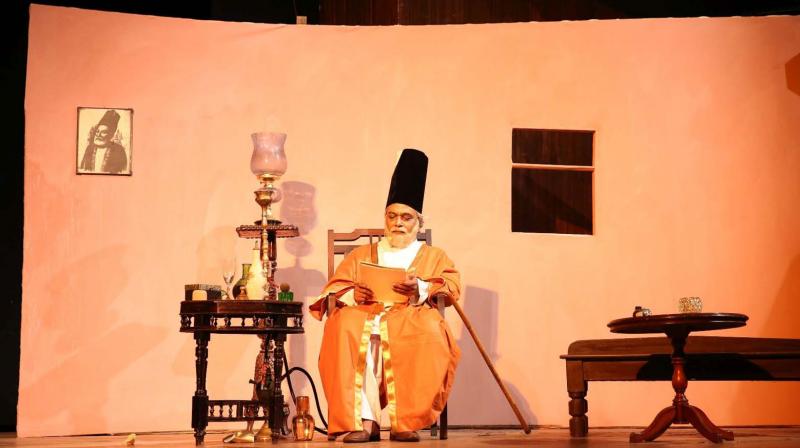Through Ghalib’s eyes: Ode to the mystics
Zikr-e-Ghalib is based on the letters of Mirza Ghalib written to his close friends and relatives in his late years.

There is something magical, poignant and nostalgic about Mirza Asadullah Khan Ghalib or Ghalib as the world knows him. Among one of the best known poets of the subcontinent, he was part of Mughal Delhi’s twilight years. A prolific poet, he was also a gifted writer apart from being an excellent Ghazal writer. Known for his sense of humour, amiable nature and liberal thoughts Ghalib was a legend in his life and after too.
This week, architect turned playwright Zafer Mohiuddin will lead audiences to deep dive to Ghalib’s mind, through the nostalgic flashback that is Zikr-e-Ghalib.
The story begins when Ghalib finds copies of his letters and an unfinished biography, made up of conversations written for friends and family. Zafer, an actor and director, is presenting Zikr-e-Ghalib through his Kathputliyaan Theatre Group. “When I was in school, I was very drawn to films. I had watched a play once as a child, in Hyderabad, where I went for the holidays. There were no auditoriums in Raichur where I grew up, and no theatre as such either.” He began writing by the time he finished high school and when he joined pre-university college, he was penning comedies, which he found people liked. “When I came to Bengaluru to study Architecture, I was exposed to Kannada theatre through the group Samodaya and subsequently, English theatre through Bangalore Little Theatre (BLT). There I learned the dimensions of the craft – lights, sound, the discipline of the stage. I even met stalwarts like M.S. Sathyu, Girish Karnad, Prasanna and B.V. Karanth. That marks my journey in theatre,” he recalls.
Once he realized that there was no group in Bengaluru dedicated to Hindustani plays, Zafer decided to branch out on his own, founding the Kathputliyaan theatre group. “I did plays like Zabaan Mili hai Magar and Khayaal ki Dastak. I was also directing for other theatre groups but then I shifted my focus to Kathputliyaan.”
He went on to direct more plays, like Girish Karnad’s Tipy Sultan Ke Khwaab (Dreams of Tipu Sultan), which he translated into Urdu from the orginal English, Zikr-e-Ghalib and then Shaadi ki Kirkir, which was a translation of Sadiqa Peerbhoy’s book ‘Marry go round’, in Hyderbabadi Urdu.
Zikr-e-Ghalib is based on the letters of Mirza Ghalib written to his close friends and relatives in his late years. These letters depict the Delhi of that era, around 150 years ago. “I worked on those letters and conceptualized it to a play, incorporating ghazals, Kathak and Ghalib’s poetry, too. Nandi Mehta choreographed the dance sequences,” says Zafer.
Admitting that the theatre-going audience has taken a beaten due to the online boom, as well as the lack of theatre spaces, Zafer believes the art form needs more support, especially from the government. Working with Urdu poetry in theatre is a challenge too, he says. “Urdu poetry is very rich but is on the decline in India. There were a few poets at one time, whose legacy became a part of Pakistan. But we had some great poets such as Iqbal, Mir, Ghalib, Jigar, Firaq. In my play I have tried my best to convey Ghalib's poetry as simply as possible, by reading his letters on stage, music and poetry. Ghalib’s thoughts are portrayed through dance.” The 85-minute play is based on a letter written by Mirza Ghalib before Independence.
What: Theatre Kathputliyan presents ‘Zikr-e-Ghalib’
When: July 13, 5pm & 7.30 pm
Where: Alliance Francaise, Vasantnagar

